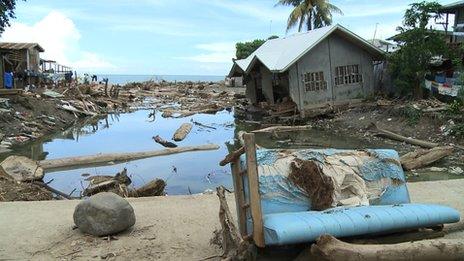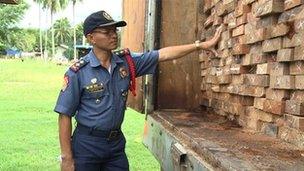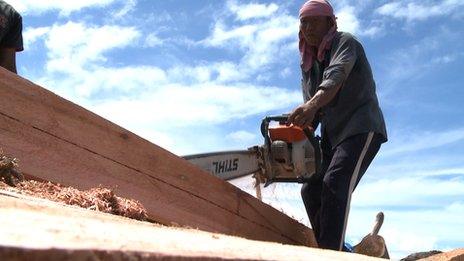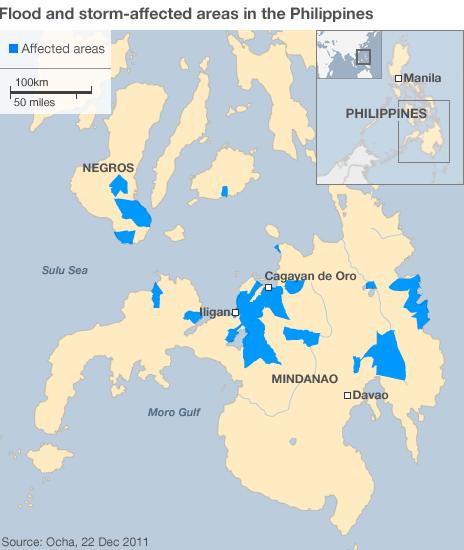Logging blamed for Philippine flood deaths
- Published
Kate McGeown visits one of the worst affected areas
Two months after floods in the southern Philippines killed more than 1,000 people, the illegal logging that exacerbated the disaster continues unabated.
A week before Christmas, Riza da Marina's house was flattened by a tidal wave of logs.
Her flimsy wooden home stood little chance against the battering of thousands of tree trunks carried downstream by the waters of Tropical Storm Washi.
She survived by climbing into a nearby mango tree, but her house has gone.
Having first sheltered in the local church she now sleeps in a tented village hastily erected on what was Iligan's bus terminal.

Mayor Cruz says the weather and logging combined with deadly consequences
Riza da Marina was lucky. On the night of 17 December 2011, local authorities say, more than 750 people died in Iligan.
They were victims of freak weather, but also of rapacious logging in nearby mountains.
"Without the logs, those that perished would have been reduced by more than half," said Iligan's Mayor Lawrence Cruz.
He must now decide whether to allow people to return and rebuild on the floodplain.
Iligan's timber tidal wave was formed by the potent combination of man's greed and nature's power. After several days of heavy rain, freshly cut logs and debris were swept off the mountains above Iligan and into the Mandulog River.
Just outside town, their passage to the sea was blocked by a bridge . A makeshift dam formed and the river burst its banks. Then at two in the morning, with a mighty crack, the bridge broke.
The release was "like a tsunami, but with more debris", according to Alfredo Mahar Lagmay, who is part of a team from the University of the Philippines sent to investigate the disaster. In a report sent to the government, he said that the death toll had been exacerbated by the decision to build on the Mandulog's floodplains.

Floods triggered by Tropical Storm Washi devastated parts of Mindanao last year
Ban reinforced
Two months on, the point where the river meets the sea is still clogged with abandoned logs. Residents have each been given an allowance of free wood and chainsaws buzz noisily as the trunks are turned into thick planks.
Raphael Abuya, a retired driver, had just picked up part of his quota to help rebuild his home.
"I blame the loggers for this," he said. "If it was just water it would have flowed through and out to sea."
That is a commonly held view. In the aftermath of Tropical Storm Washi, President Benigno Aquino restated the ban on all logging in the Philippines. But everyone knows it is still happening.

Police say seized containers of logs are worth thousands of dollars each
In the yard at Iligan police station sat three lorryloads of mahogany seized during the previous few days. One of the lorries contained what looked like freshly cut logs, green leaves still sprouting off some of the trunks. They had been hidden by just a tarpaulin.
The other two vehicles had been more sophisticated in their attempts to avoid detection. The logs were cut at sawmills high in the mountains, turned into planks and packed into sealed containers.
"Each container could be sold in the market for almost 400,000 pesos ($9,300, £6,000)," police superintendent Enrique Belacaol said.
The cut mahogany was discovered only by a stroke of good fortune. The trucks were involved in a traffic accident and the drivers fled.
But the events of 17 December showed that the river remains the preferred method of transport for the loggers.
A system had apparently been in operation on the Mandulog river whereby logs were cut and stored in the mountains before being floated downriver at night to be cut at sawmills.
When the tropical storm swamped the river, all the logs were washed down in one go. In the immediate aftermath logs stretched along 7km (4.5 miles) of Mindanao's coastline.
Rebel groups
The continued problem of illegal logging in the Philippines is in part a product of the complex and often corrupt political system.

Residents are using logs washed downstream by the floods
The mountains where most of Iligan's logs came from are part of the Autonomous Region in Muslim Mindanao (ARMM). It was formed in 1990 to try to satisfy the minority Muslim population's desire for greater independence.
One of the Philippines' poorest regions, it has been given some of its own revenue-generating powers and has issued permits to logging companies.
But the creation of the ARMM has not brought stability to the region. Disaffected rebel groups still roam the mountains, so we travelled up the Mandulog River with a military escort.
In one village - residents asked that it not be named - people were conflicted. Like Iligan the village had been caught up in the devastation of Washi. Homes had been destroyed and the school is now a cluster of tents pitched in a muddy clearing.
But there was none of the anger of people further downstream. Instead there was a sadness - an acceptance that they had played their own small part in creating the misery.

Saidomar Manromayan says he needs to log to feed his family
"I need to support my family by doing logging," said 27-year-old Saidomar Manromayan. "We wonder why the government is blaming us for our small-scale logging because a lot of companies, they have permits here to do large-scale logging in the mountains."
Around him villagers nodded in agreement. Thirty people died in the village in the floods, but everyone agreed that they could not afford to stop cutting down trees.
Back on the coast in Iligan, Riza de Marina remains worried. She has just reported a suspected case of illegal logging to the police. And the water and the violent memories it triggers upset her.
"I can't sleep at night when it rains because I'm always thinking what might happen if it continues," she says.
A new governor has just taken over in the ARMM with promises to stop cutting down trees.
"I would like to believe that Governor Mujib Hataman can deliver," Mayor Cruz says.
If he does not the people of Iligan will continue to live their lives looking nervously at the clouds.

- Published23 December 2011
- Published23 December 2011
- Published19 December 2011